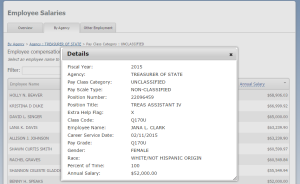UPDATE II: I was originally told by someone familiar with Joint Budget that the Governor’s Office had not obtained permission to hire Phyllis Bell, an allegation which seemed to be supported by the available records on the JBC website. Following the publication of this post, the source discovered that the Governor’s Office had, in fact, obtained the required waiver for Ms. Bell. Accordingly, the post has been updated to reflect this new information. I apologize for the incorrect information in the previous version of this story.
UPDATE: In tracking down this story, I was told that Gov. Hutchinson did not get Joint Budget approval. According to the Arkansas Blog, the Governor’s Office says they did. I’m attempting to get to the bottom of the differing accounts.
***
In 1999, then-State Senator Mike Beebe (D-Searcy) was the lead sponsor of Senate Bill 20, entitled in part, “An Act to Regulate State Employment of Constitutional Officers, and Their Spouses[.]” The bill proved overwhelmingly popular, eventually drawing 121 co-sponsors and passing easily, and it was signed into law as Act 34 of 1999 by then-Governor Mike Huckabee.
Act 34 remains in place to this day. Among other prohibitions, the law states:
No person whose spouse is elected to a constitutional office may, after the spouse is elected to the constitutional office and during the term for which the spouse is elected, enter into employment with any state agency without the prior approval of the Joint Budget Committee during a legislative session, the Legislative Council between legislative sessions, and the Governor.
Ark. Code Ann. § 21-1-402(b). Furthermore, for purposes of this law, “constitutional office” is specifically defined to include members of the General Assembly and “state agency” is defined broadly to include “every board, commission, department, division, institution, and other office of state government whether located within the legislative, executive, or judicial branch of government and including state-supported colleges and universities.” Ark. Code Ann. § 21-1-401.
That’s all pretty straightforward, right? If your spouse is elected to a “constitutional office” and you are not already employed by a state agency, you cannot go to work for a state agency without prior approval from either Joint Budget (if the legislature is in session when you are hired) or Legislative Council (if the legislature is out of session when you are hired), as well as approval from the Governor. It seems like that would be difficult to mess up.
Which brings us, first, to State Treasurer Dennis Milligan, who hired Jana Clark, wife of State Senator Alan Clark (R-Lonsdale), on or about February 11, 2015. Sen. Clark was first elected to the Arkansas General Assembly in 2012 and took office in January 2013. Mr. Milligan, of course, was elected Treasurer in 2014 and took office in January 2015. The 90th General Assembly convened on January 12, 2015. At that point, if Mr. Milligan wanted to hire Sen. Clark’s wife, Jana, Milligan was required get approval from the Joint Budget Committee and from Gov. Hutchinson.
Now, there is one exception to the prohibition, which is that an elected official’s spouse can be hired without the required approval, as long as their “salary does not exceed the amount prescribed by Level 4 of Grade 13 of the state compensation plan.” The problem for Mr. Milligan and Ms. Clark, however, is that she is making $52,000 per year, while the salary for Level 4 of Grade 13 of the state pay plan is $45,064 per year. So that exception does not apply. All of which is to say, Dennis Milligan has (yet again) run afoul of state hiring prohibitions.
While unfortunate in terms of who bears the brunt of this failure to follow the law, at a bare minimum, the employment of Ms. Clark should be terminated effective immediately. Where it gets interesting, however, is when you look at Ark. Code Ann. § 21-1-405, which states that any knowing violation of this statute is a Class D felony. Mr. Milligan’s excuse for improperly hiring his cousin was that he was unaware that the hiring was illegal, so one assumes that he would say the same in this instance, even if his continued ignorance of state hiring rules is somewhat unsettling at best.
Note: This post has been edited to reflect corrected information.
